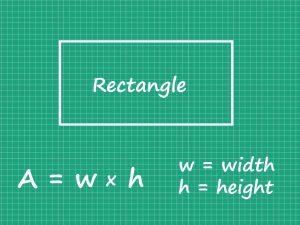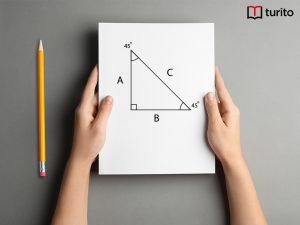Key Concepts
- Use volume of a prism.
- Find the volume of an oblique cylinder.
- Solve a real-world problem.
Theorem 10.11
If the tangent and a chord intersect at a point on a circle, then the measure of each angle
formed is one half the measure of its intercepted arc.


This proof will consist of two parts. The first and second equations of the theorem will be proved one at a time.

Consider a diameter . Since is tangent to the circle at A, by the Tangent to Circle Theorem, and are perpendicular.
i.e ∠FAB + ∠BAD = 90° ………..Theorem 10.1
∠FAB =90° – ∠BAD
1/2m FB = 90° – ∠BAD……. Theorem 10.7
1/2m FB = 90° – m∠1
mFB = 2(90° – m∠1)
mFB = 180° – 2m∠1 ……………………….. 1
mFB +mAB =180° …………Arc addition postulate
180° – 2m∠1 + mAB = 180° …………………Substitute first equation
–2m∠1+ mAB =0
mFB +mAB =180° ………. Arc addition postulate
180° – 2m∠1 + mAB = 180° ……….. Substitute first equation
– 2m∠1 + mAB =0
– 2m∠1 = – mAB
2m∠1 = mAB
m∠1 = mAB (By solving equation)
Similarly, m∠2 = 1/2m AB
Example 1:
Line m is tangent to the circle. Find the measure of the red angle or arc

Solution:
Theorem10.11: One half the measure of the intercepted arc.
m∠1 = SMALL ARC / 2
= 1/2 (1300)
= 65
∴ m∠1 = 650
Line M is tangent to the circle. Find the measure of the red angle or arc.

Solution:
Theorem10.11: One half the measure of the intercepted arc
m KJL/2= 1250 …………..
m KJL = 2.(1250)
= 2500
∴ m KJL= 2500
Guided practice for Example 1:

1. m∠1 2. mRST 3. mXY
1. m∠1
Solution:
Theorem10.11: One half the measure of the intercepted arc.
m∠1 = 1/2 (2100) …….
= 1050
∴ m∠1 = 1050
2. mRST

Solution:
Theorem10.11: One half the measure of the intercepted arc.
mRST / 2=980…………
m = 2(980)
= 1960
∴ mRST = 1960
3. mXY

Solution:
mXY/2=800
m = 2(800)
= 1600
∴ mXY = 1600
Intersecting Lines and Circles
If two lines intersect a circle, there are three places where the lines can intersect.
- On the circle

- Inside the circle

- Outside the circle

- Angle inside the circle theorem
Theorem 10.12
If two chords intersect inside a circle, then the measure of each angle is one half the sum of the measures of the arcs intercepted by the angle and its vertical angle.

Example 2:
Find the value of x.

Solution:
x° = 1/2 (mJM + mKL ) (Use Theorem 10.12)
x° = 1/2 (130°+ 156°) (Substitute)
x° = 1/2 (156°)
x° = 143° (Simplify)
Theorem 10.13
If a tangent and a secant two tangents, or two secants intersect outside a circle, then the measure of the angle formed is one half the difference of the measures of the intercepted arcs.


Example 3:
- Find the value of x.

Solution:
The tangent CD and the secant CB intersect outside the circle.
x° = 1/2 ( 247° – 113°)
m ∠BCD = 1/2 (mAD – mBD) (Use theorem 10.13)
𝑥 ° = 1/2 ( 134° – 76°) (Substitute)
∴ 𝑥 = 51° (Simplify)
- Find the value of x

Solution:
One half the measure of the difference of the intercepted arcs.
x° = 1/2 ( 247° – 113°)
𝑥 ° = 1/2 ( 134° ) (Substitute)
∴ 𝑥 = 67°
- Find the value of a.

Solution:

One half the measure of the difference of the intercepted arcs
30 = 1/ 2(a−44)
60 = a−44
a = 104°
Example 4:
The Northern lights are bright flashes of colored light 50 and 200 miles above Earth.
Suppose a flash occurs 150 miles above Earth. What is the measure of arc BD, the portion
Of Earth from which the flash is visible?
(Earth’s Radis is approximately 4000 miles.)

Let’s Check your Knowledge
Find the value of x. Any lines that appear to be tangent can be assumed to be tangent.

2

3.

4.

5.

6.

Answers



Exercise
- Line m is tangent to the circle. Find the indicated measure.
i. m∠1

- m∠RST

- Find the value of x.

- Find the value of x.

- Find the value of the variable.

- Find the value of x.

Concept Map

What have we learned
- Understand how to find angle and arc measures.
- Understand how to find an angle measure inside a circle.
- Understand how to find an angle measure outside a circle.
- Understand how to solve a real–word problem.

Related topics
Addition and Multiplication Using Counters & Bar-Diagrams
Introduction: We can find the solution to the word problem by solving it. Here, in this topic, we can use 3 methods to find the solution. 1. Add using counters 2. Use factors to get the product 3. Write equations to find the unknown. Addition Equation: 8+8+8 =? Multiplication equation: 3×8=? Example 1: Andrew has […]
Read More >>Dilation: Definitions, Characteristics, and Similarities
Understanding Dilation A dilation is a transformation that produces an image that is of the same shape and different sizes. Dilation that creates a larger image is called enlargement. Describing Dilation Dilation of Scale Factor 2 The following figure undergoes a dilation with a scale factor of 2 giving an image A’ (2, 4), B’ […]
Read More >>How to Write and Interpret Numerical Expressions?
Write numerical expressions What is the Meaning of Numerical Expression? A numerical expression is a combination of numbers and integers using basic operations such as addition, subtraction, multiplication, or division. The word PEMDAS stands for: P → Parentheses E → Exponents M → Multiplication D → Division A → Addition S → Subtraction Some examples […]
Read More >>System of Linear Inequalities and Equations
Introduction: Systems of Linear Inequalities: A system of linear inequalities is a set of two or more linear inequalities in the same variables. The following example illustrates this, y < x + 2…………..Inequality 1 y ≥ 2x − 1…………Inequality 2 Solution of a System of Linear Inequalities: A solution of a system of linear inequalities […]
Read More >>Other topics











Comments: